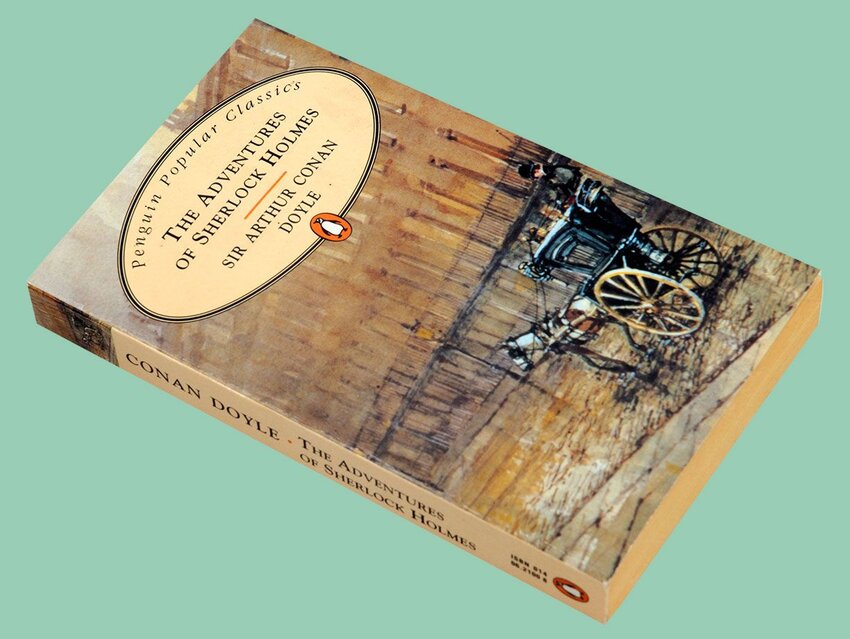Sherlock Holmes was a fictional detective created by Scottish author Sir Arthur Conan Doyle, who arguably laid the groundwork for the entire genre of detective stories that dominate literature, film, and television — the thread can be traced all the way from Doyle’s 19th-century stories to modern television shows such as CSI and Law & Order. First appearing in Doyle’s A Study in Scarlet (1887), the character has gone on to be depicted in innumerable book, television, and film adaptations. Perhaps Holmes’ legacy owes tribute to Doyle’s inventive use of language, laid out here with a smattering of words used frequently in the texts.
Deduction
Holmes frequently attributed his crime-solving prowess to deduction, as he says in The Sign of Four (1890): “Yes, I have a turn both for observation and for deduction. The theories which I have expressed there, and which appear to you to be so chimerical are really extremely practical — so practical that I depend upon them for my bread and cheese.”
“Deduction” means “the deriving of a conclusion by reasoning; specifically inference in which the conclusion about particulars follows necessarily from general or universal premises.” In other words, coming to a conclusion based on details that are available to anyone, but only if they are noticed — a skill that Holmes seemed to be better at than anyone else.
Goyal
Here is a spelling variant for the word “goyle,” a dialectal English word meaning “a steep, narrow valley,” like a ravine or a gully. It’s seen in The Hound of the Baskervilles (1902), which begins with a 1742 document that explains the curse placed upon the Baskerville family. It reads: “Riding slowly in this fashion they came at last upon the hounds. These, though known for their valour and their breed, were whimpering in a cluster at the head of a deep dip or goyal, as we call it, upon the moor, some slinking away and some, with starting hackles and staring eyes, gazing down the narrow valley before them.”
While many of the words in the Sherlock Holmes stories seem charmingly antiquated to 21st-century readers, scholars believe Doyle used this word in particular to give his Victorian/Edwardian prose a more archaic tone.
Ennui
“Ennui” is a French loanword describing a feeling of listlessness originating from a lack of purpose or excitement — it’s nearly synonymous with boredom. Holmes uses it to describe what he feels when he’s not on a case. The emotion comes at the end of The Adventure of the Red Headed League (1890): “‘It saved me from my ennui,’ he answered, yawning. ‘Alas! I already feel it closing in upon me. My life is spent in one long effort to escape from the commonplaces of existence.’”
Valetudinarian
This unusual word with roots in Latin means “a person of a weak or sickly constitution, especially one whose chief concern is his or her ill health.” It’s seen in The Sign of Four, pertaining to the fidgety and nervous Thaddeus Sholto. Doyle writes: “Our new acquaintance very deliberately coiled up the tube of his hookah, and produced from behind a curtain a very long, befrogged top coat with astrakhan collar and cuffs. This he buttoned tightly up, in spite of the extreme closeness of the night, and finished his attire by putting on a rabbit-skin cap with hanging lappets which covered the ears, so that no part of him was visible save his mobile and peaky face. ‘My health is somewhat fragile,’ he remarked, as he led the way down the passage. ‘I am compelled to be a valetudinarian.’”
This passage in particular shows Doyle’s illustrious penchant for language, also containing words such as “befrogged” (“adorned with a front fastening of braid in an ornamental looped design”) and “closeness” (here meaning “hot and stuffy conditions”). While most of Doyle’s writing can be understood easily by modern readers through context clues, dedicated learners might want to keep a dictionary at hand to look up some of these more old-fashioned terms.
Elementary
While we’d be remiss to leave “elementary” out of a list of words used by Sherlock Holmes, it’s worth noting that he never actually said the famous phrase “Elementary, my dear Watson!” in any of the books. The word means “of the most basic kind” or “straightforward and uncomplicated.” He comes close, using the word in The Crooked Man (1893), and saying, “It was very superficial, my dear Watson, I assure you,” in The Cardboard Box (1893). The notable phrase became attributed to the detective through several later adaptations.
Featured image credit: CBW/ Alamy Stock Photo

